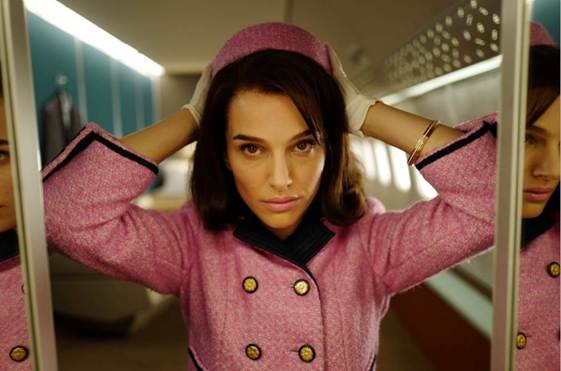Nevertheless, Jackie mourns for her dead husband as if he was always faithful and loving. Spattered with blood and gore from JFK's death, Portman wears a dazed look underneath her iconic pillbox hat. Her grief drives her to drink in a boozy sequence, stalking around the presidential quarters with a bottle of gin as she tries on dresses and listens to songs extolling the legend of Camelot. Mica Levi, the composer behind the haunting score to Under the Skin, is just as atmospheric here, with tense strings subbing in for the frayed nerves firing in Jackie's head. These scenes of Jackie by herself or with a priest played by John Hurt seem to be her at the closest thing to honesty, like this self-shielded woman no longer has the energy to keep up the facade. At her most vulnerable, figures in both JFK's outgoing and LBJ's incoming administration are fine with shunting her aside, both because that's the way it goes with a new first family needing to move into the White House and because, beyond simple kindness, there's no longer any reason for people at the top of the food chain to pay her anymore attention.
With her grand final gesture, Jackie shows that she will not be ignored. Beneath her studied persona as a pliant wife and mother, she's hiding a canny font of intelligence, and in the wake of JFK's death, she's immediately thinking about the funeral and the image of her husband that she is going to leave the country with. A student of history who knows how forgotten past assassinated presidents like Garfield and McKinley are, she wants everyone to make a connection between her husband, derided accurately by Peter Sarsgaard's RFK as a middling president whose greatest accomplishment was solving a crisis of his own making, and Lincoln, universally regarded as the country's greatest president. Further massaging history as it's being made with Crudup's reporter, she strikes certain things and writes others for him with a view far into the future, mastering one more piece of perception and one more potential haughty roadblock. This is the last gift she can give to her husband. Just as she cultivated a sense of him as a tasteful and cultured man of letters, she'll almost single-handedly ensure that people admire him long after they can't think of a single positive thing to say about his record.
Jackie depicts the former first lady as a skillful player equal to any of the time period, but one hampered by the regressive society of the time. Left with little choice, she wielded her feminine power as well as she could, carving out a legacy for her family that has withstood decades of intervening time. Portman gives perhaps the finest performance of her career, less showy than her epic turn in Black Swan but with a fantastically weird accent to boot, and Larrain and his crew are technically superb. This film is about the first draft of history forming across brows and tentatively spoken as trial balloons, an intriguingly rare approach to period dramas about real events. In going for the macro of that heady subject and the micro of a woman adjusting to the loss of her husband, Larrain bridges the gap between the grand figures that Jackie constructs and the real person that she might have been. A-

 RSS Feed
RSS Feed